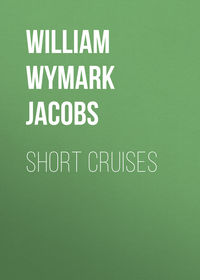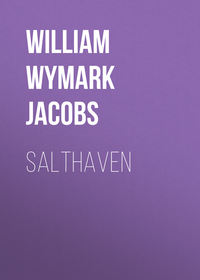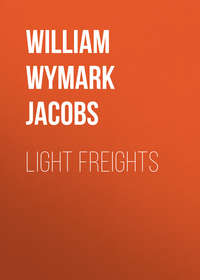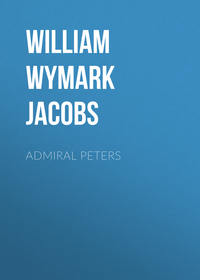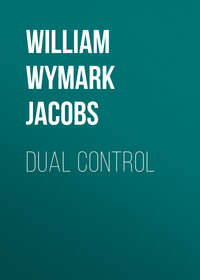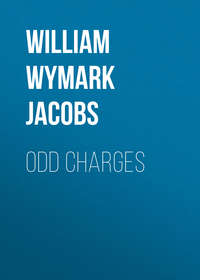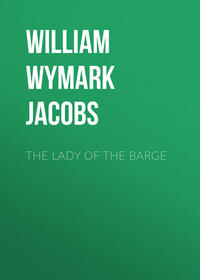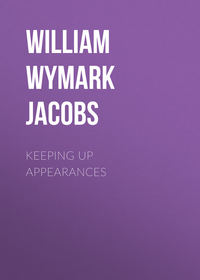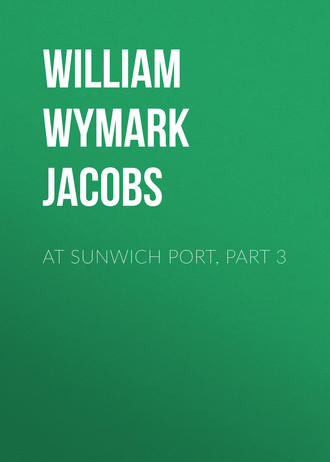 полная версия
полная версияAt Sunwich Port, Part 3

W. W. Jacobs
At Sunwich Port, Part 3. / Contents: Chapters 11-15
CHAPTER XI
Jack Nugent's first idea on seeing a letter from his father asking him to meet him at Samson Wilks's was to send as impolite a refusal as a strong sense of undutifulness and a not inapt pen could arrange, but the united remonstrances of the Kybird family made him waver.
"You go," said Mr. Kybird, solemnly; "take the advice of a man wot's seen life, and go. Who knows but wot he's a thinking of doing something for you?"
"Startin' of you in business or somethin'," said Mrs. Kybird. "But if 'e tries to break it off between you and 'Melia I hope you know what to say."
"He won't do that," said her husband.
"If he wants to see me," said Mr. Nugent, "let him come here."
"I wouldn't 'ave 'im in my house," retorted Mr. Kybird, quickly. "An Englishman's 'ouse is his castle, and I won't 'ave him in mine."
"Why not, Dan'l," asked his wife, "if the two families is to be connected?"
Mr. Kybird shook his head, and, catching her eye, winked at her with much significance.
"'Ave it your own way," said Mrs. Kybird, who was always inclined to make concessions in minor matters. "'Ave it your own way, but don't blame me, that's all I ask."
Urged on by his friends Mr. Nugent at last consented, and, in a reply to his father, agreed to meet him at the house of Mr. Wilks on Thursday evening. He was not free him-self from a slight curiosity as to the reasons which had made the captain unbend in so unusual a fashion.
Mr. Nathan Smith put in an appearance at six o'clock on the fatal evening. He was a short, slight man, with a clean-shaven face mapped with tiny wrinkles, and a pair of colourless eyes the blankness of whose expression defied research. In conversation, especially conversation of a diplomatic nature, Mr. Smith seemed to be looking through his opponent at something beyond, an uncomfortable habit which was a source of much discomfort to his victims.
"Here we are, then, Mr. Wilks," he said, putting his head in the door and smiling at the agitated steward.
"Come in," said Mr. Wilks, shortly.
Mr. Smith obliged. "Nice night outside," he said, taking a chair; "clear over'ead. Wot a morning it 'ud be for a sail if we was only young enough. Is that terbacker in that canister there?"
The other pushed it towards him.
"If I was only young enough—and silly enough," said the boarding-house master, producing a pipe with an unusually large bowl and slowly filling it, "there's nothing I should enjoy more than a three years' cruise. Nothing to do and everything of the best."
"'Ave you made all the arrangements?" inquired Mr. Wilks, in a tone of cold superiority.
Mr. Smith glanced affectionately at a fish-bag of bulky appearance which stood on the floor between his feet. "All ready," he said, cheerfully, an' if you'd like a v'y'ge yourself I can manage it for you in two twos. You've on'y got to say the word."
"I don't want one," said the steward, fiercely; "don't you try none o' your larks on me, Nathan Smith, cos I won't have it."
"Lord love your 'art," said the boarding-master, "I wouldn't 'urt you. I'm on'y acting under your orders now; yours and the captin's. It ain't in my reg'lar way o' business at all, but I'm so good-natured I can't say 'no.'"
"Can't say 'no' to five pounds, you mean," retorted Mr. Wilks, who by no means relished these remarks.
"If I was getting as much out of it as you are I'd be a 'appy man," sighed Mr. Smith.
"Me!" cried the other; do you think I'd take money for this—why, I'd sooner starve, I'd sooner. Wot are you a-tapping your nose for?"
"Was I tapping it?" demanded Mr. Smith, in surprise. "Well, I didn't know it. I'm glad you told me."
"You're quite welcome," said the steward, sharply. "Crimping ain't in my line; I'd sooner sweep the roads."
"'Ear, 'ear," exclaimed Mr. Smith, approvingly. "Ah! wot a thing it is to come acrost an honest man. Wot a good thing it is for the eyesight."
He stared stonily somewhere in the direction of Mr. Wilks, and then blinking rapidly shielded his eyes with his hand as though overcome by the sight of so much goodness. The steward's wrath rose at the performance, and he glowered back at him until his eyes watered.
"Twenty past six," said Mr. Smith, suddenly, as he fumbled in his waistcoat-pocket and drew out a small folded paper. "It's time I made a start. I s'pose you've got some salt in the house?"
"Plenty," said Mr. Wilks.
"And beer?" inquired the other.
"Yes, there is some beer," said the steward.
"Bring me a quart of it," said the boarding-master, slowly and impressively. "I want it drawed in a china mug, with a nice foaming 'ead on it."
"Wot do you want it for?" inquired Mr. Wilks, eyeing him very closely.
"Bisness purposes," said Mr. Smith. "If you're very good you shall see 'ow I do it."
Still the steward made no move. "I thought you brought the stuff with you," he remarked.
Mr. Smith looked at him with mild reproach. "Are you managing this affair or am I?" he inquired.
The steward went out reluctantly, and drawing a quart mug of beer set it down on the table and stood watching his visitor.
"And now I want a spoonful o' sugar, a spoonful o' salt, and a spoonful o' vinegar," said Mr. Smith. "Make haste afore the 'ead goes off of it."
Mr. Wilks withdrew grumbling, and came back in a wonderfully short space of time considering, with the articles required.
"Thankee," said the other; "you 'ave been quick. I wish I could move as quick as you do. But you can take 'em back now, I find I can do without 'em."
"Where's the beer?" demanded the incensed Mr. Wilks; where's the beer, you underhanded swab?"
"I altered my mind," said Mr. Smith, "and not liking waste, and seeing by your manner that you've 'ad more than enough already to-night, I drunk it. There isn't another man in Sunwich I could ha' played that trick on, no, nor a boy neither."
Mr. Wilks was about to speak, but, thinking better of it, threw the three spoons in the kitchen, and resuming his seat by the fire sat with his back half turned to his visitor.
"Bright, cheerful young chap, 'e is," said Mr. Smith; "you've knowed 'im ever since he was a baby, haven't you?"
Mr. Wilks made no reply.
"The Conqueror's sailing to-morrow morning, too," continued his tormentor; "his father's old ship. 'Ow strange it'll seem to 'im following it out aboard a whaler. Life is full o' surprises, Mr. Wilks, and wot a big surprise it would be to you if you could 'ear wot he says about you when he comes to 'is senses."
"I'm obeying orders," growled the other.
"Quite right," said Mr. Smith, approvingly, as he drew a bottle of whisky from his bag and placed it on the table. "Two glasses and there we are. We don't want any salt and vinegar this time."
Mr. Wilks turned a deaf ear. "But 'ow are you going to manage so as to make one silly and not the other?" he inquired.
"It's a trade secret," said the other; "but I don't mind telling you I sent the cap'n something to take afore he comes, and I shall be in your kitchen looking arter things."
"I s'pose you know wot you're about?" said Mr. Wilks, doubtfully.
"I s'pose so," rejoined the other. "Young Nu-gent trusts you, and, of course, he'll take anything from your 'ouse. That's the beauty of 'aving a character, Mr. Wilks; a good character and a face like a baby with grey whiskers."
Mr. Wilks bent down and, taking up a small brush, carefully tidied up the hearth.
"Like as not, if my part in it gets to be known," pursued Mr. Smith, mournfully, "I'll 'ave that gal of Kybird's scratching my eyes out or p'r'aps sticking a hat-pin into me. I had that once; the longest hat-pin that ever was made, I should think."
He shook his head over the perils of his calling, and then, after another glance at the clock, withdrew to the kitchen with his bag, leaving Mr. Wilks waiting in a state of intense nervousness for the arrival of the others.
Captain Nugent was the first to put in an appearance, and by way of setting a good example poured a little of the whisky in his glass and sat there waiting. Then Jack Nugent came in, fresh and glowing, and Mr. Wilks, after standing about helplessly for a few moments, obeyed the captain's significant nod and joined Mr. Smith in the kitchen.
"You'd better go for a walk," said that gentle-man, regarding him kindly; "that's wot the cap'n thought."
Mr. Wilks acquiesced eagerly, and tapping at the door passed through the room again into the street. A glance as he went through showed him that Jack Nugent was drinking, and he set off in a panic to get away from the scene which he had contrived.
He slackened after a time and began to pace the streets at a rate which was less noticeable. As he passed the Kybirds' he shivered, and it was not until he had consumed a pint or two of the strongest brew procurable at the Two Schooners that he began to regain some of his old self-esteem. He felt almost maudlin at the sacrifice of character he was enduring for the sake of his old master, and the fact that he could not narrate it to sympathetic friends was not the least of his troubles.
The shops had closed by the time he got into the street again, and he walked down and watched with much solemnity the reflection of the quay lamps in the dark water of the harbour. The air was keen and the various craft distinct in the starlight. Perfect quiet reigned aboard the Seabird, and after a vain attempt to screw up his courage to see the victim taken aboard he gave it up and walked back along the beach.
By the time he turned his steps homewards it was nearly eleven o'clock. Fullalove Alley was quiet, and after listening for some time at his window he turned the handle of the door and passed in. The nearly empty bottle stood on the table, and an over-turned tumbler accounted for a large, dark patch on the table-cloth. As he entered the room the kitchen door opened and Mr. Nathan Smith, with a broad smile on his face, stepped briskly in.
"All over," he said, rubbing his hands; "he went off like a lamb, no trouble nor fighting. He was a example to all of us."
"Did the cap'n see 'im aboard?" inquired Mr. Wilks.
"Certainly not," said the other. "As a matter o' fact the cap'n took a little more than I told 'im to take, and I 'ad to help 'im up to your bed. Accidents will 'appen, but he'll be all right in the morning if nobody goes near 'im. Leave 'im perfectly quiet, and when 'e comes downstairs give 'im a strong cup o' tea."
"In my bed?" repeated the staring Mr. Wilks.
"He's as right as rain," said the boarding master. "I brought down a pillow and blankets for you and put 'em in the kitchen. And now I'll take the other two pound ten and be getting off 'ome. It ought to be ten pounds really with the trouble I've 'ad."
Mr. Wilks laid the desired amount on the table, and Mr. Nathan Smith placing it in his pocket rose to go.
"Don't disturb 'im till he's 'ad 'is sleep out, mind," he said, pausing at the door, "else I can't answer for the consequences. If 'e should get up in the night and come down raving mad, try and soothe 'im. Good-night and pleasant dreams."
He closed the door after him quietly, and the horrified steward, after fetching the bed-clothes on tiptoe from the kitchen, locked the door which led to the staircase, and after making up a bed on the floor lay down in his clothes and tried to get to sleep.
He dozed off at last, but woke up several times during the night with the cold. The lamp burnt itself out, and in the dark he listened intently for any sounds of life in the room above. Then he fell asleep again, until at about half-past seven in the morning a loud crash overhead awoke him with a start.
In a moment he was sitting up with every faculty on the alert. Footsteps blundered about in the room above, and a large and rapidly widening patch of damp showed on the ceiling. It was evident that the sleeper, in his haste to quench an abnormal thirst, had broken the water jug.
Mr. Wilks, shivering with dread, sprang to his feet and stood irresolute. Judging by the noise, the captain was evidently in a fine temper, and Mr. Smith's remarks about insanity occurred to him with redoubled interest. Then he heard a hoarse shout, the latch of the bedroom door clicked, and the prisoner stumbled heavily downstairs and began to fumble at the handle of the door at the bottom. Trembling with excitement Mr. Wilks dashed forward and turned the key, and then retreating to the street door prepared for instant flight.
He opened the door so suddenly that the man on the other side, with a sudden cry, fell on all fours into the room, and raising his face stared stupidly at the steward. Mr. Wilks's hands dropped to his sides and his tongue refused its office, for in some strange fashion, quite in keeping with the lawless proceedings of the previous night, Captain Nugent had changed into a most excellent likeness of his own son.
CHAPTER XII
For some time Mr. Wilks stood gazing at this unexpected apparition and trying to collect his scattered senses. Its face was pale and flabby, while its glassy eyes, set in rims of red eyelids, were beginning to express unmistakable signs of suspicion and wrath. The shock was so sudden that the steward could not even think coherently. Was the captain upstairs? And if so, what was his condition? Where was Nathan Smith? And where was the five pounds?
A voice, a husky and discordant voice, broke in upon his meditations; Jack Nugent was also curious.
"What does all this mean?" he demanded, angrily. "How did I get here?"
"You—you came downstairs," stammered Mr. Wilks, still racking his brains in the vain effort to discover how matters stood.
Mr. Nugent was about to speak, but, thinking better of it, turned and blundered into the kitchen. Sounds of splashing and puffing ensued, and the steward going to the door saw him with his head under the tap. He followed him in and at the right time handed him a towel. Despite the disordered appearance of his hair the improvement in Mr. Nugent's condition was so manifest that the steward, hoping for similar results, turned the tap on again and followed his example.
"Your head wants cooling, I should think," said the young man, returning him the towel. "What's it all about?"
Mr. Wilks hesitated; a bright thought occurred to him, and murmuring something about a dry towel he sped up the narrow stairs to his bedroom. The captain was not there. He pushed open the small lattice window and peered out into the alley; no sign of either the captain or the ingenious Mr. Nathan Smith. With a heavy heart he descended the stairs again.
"Now," said Mr. Nugent, who was sitting down with his hands in his pockets, "perhaps you'll be good enough to explain what all this means."
"You were 'ere last night," said Mr. Wilks, "you and the cap'n."
"I know that," said Nugent. "How is it I didn't go home? I didn't understand that it was an all-night invitation. Where is my father?"
The steward shook his head helplessly. "He was 'ere when I went out last night," he said, slowly. "When I came back the room was empty and I was told as 'e was upstairs in my bed."
"Told he was in your bed?" repeated the other. "Who told you?"
He pushed open the small lattice window and peered out into the alley.
Mr. Wilks caught his breath. "I mean I told myself 'e was in my bed," he stammered, "because when I came in I see these bed-clothes on the floor, an' I thought as the cap'n 'ad put them there for me and taken my bed 'imself."
Mr. Nugent regarded the litter of bed-clothes as though hoping that they would throw a little light on the affair, and then shot a puzzled glance at Mr. Wilks.
"Why should you think my father wanted your bed?" he inquired.
"I don't know," was the reply. "I thought p'r'aps 'e'd maybe taken a little more than 'e ought to have taken. But it's all a myst'ry to me. I'm more astonished than wot you are."
"Well, I can't make head or tail of it," said Nugent, rising and pacing the room. "I came here to meet my father. So far as I remember I had one drink of whisky—your whisky—and then I woke up in your bedroom with a splitting headache and a tongue like a piece of leather. Can you account for it?"
Mr. Wilks shook his head again. "I wasn't here," he said, plucking up courage. "Why not go an' see your father? Seems to me 'e is the one that would know most about it."
Mr. Nugent stood for a minute considering, and then raising the latch of the door opened it slowly and inhaled the cold morning air. A subtle and delicate aroma of coffee and herrings which had escaped from neighbouring breakfast-tables invaded the room and reminded him of an appetite. He turned to go, but had barely quitted the step before he saw Mrs. Kingdom and his sister enter the alley.
Mr. Wilks saw them too, and, turning if anything a shade paler, supported himself by the door-pest. Kate Nugent quickened her pace as she saw them, and, after a surprised greeting to her brother, breathlessly informed him that the captain was missing.
"Hasn't been home all night," panted Mrs. Kingdom, joining them. "I don't know what to think."
They formed an excited little group round the steward's door, and Mr. Wilks, with an instinctive feeling that the matter was one to be discussed in private, led the way indoors. He began to apologize for the disordered condition of the room, but Jack Nugent, interrupting him brusquely, began to relate his own adventures of the past few hours.
Mrs. Kingdom listened to the narrative with unexpected calmness. She knew the cause of her nephew's discomfiture. It was the glass of whisky acting on a system unaccustomed to alcohol, and she gave a vivid and moving account of the effects of a stiff glass of hot rum which she had once taken for a cold. It was quite clear to her that the captain had put his son to bed; the thing to discover now was where he had put himself.
"Sam knows something about it," said her nephew, darkly; "there's something wrong."
"I know no more than a babe unborn," declared Mr. Wilks. "The last I see of the cap'n 'e was a-sitting at this table opposite you."
"Sam wouldn't hurt a fly," said Miss Nugent, with a kind glance at her favourite.
"Well, where is the governor, then?" inquired her brother. "Why didn't he go home last night? He has never stayed out before."
"Yes, he has," said Mrs. Kingdom, folding her hands in her lap. "When you were children. He came home at half-past eleven next morning, and when I asked him where he'd been he nearly bit my head off. I'd been walking the floor all night, and I shall never forget his remarks when he opened the door to the police, who'd come to say they couldn't find him. Never."
A ghostly grin flitted across the features of Mr. Wilks, but he passed the back of his hand across his mouth and became serious again as he thought of his position. He was almost dancing with anxiety to get away to Mr. Nathan Smith and ask for an explanation of the proceedings of the night before.
"I'll go and have a look round for the cap'n," he said, eagerly; "he can't be far."
"I'll come with you," said Nugent. "I should like to see him too. There are one or two little things that want explaining. You take aunt home, Kate, and I'll follow on as soon as there is any news."
As he spoke the door opened a little way and a head appeared, only to be instantly withdrawn at the sight of so many people. Mr. Wilks stepped forward hastily, and throwing the door wide open revealed the interesting features of Mr. Nathan Smith.
"How do you do, Mr. Wilks?" said that gentleman, softly. "I just walked round to see whether you was in. I've got a message for you. I didn't know you'd got company."
He stepped into the room and, tapping the steward on the chest with a confidential finger, backed him into a corner, and having got him there gave an expressive wink with one eye and gazed into space with the other.
"I thought you'd be alone," he said, looking round, "but p'r'aps it's just as well as it is. They've got to know, so they may as well know now as later on."
"Know what?" inquired Jack Nugent, abruptly. "What are you making that face for, Sam?"
Mr. Wilks mumbled something about a decayed tooth, and to give colour to the statement continued a series of contortions which made his face ache.
"You should take something for that tooth," said the boarding-master, with great solicitude. "Wot do you say to a glass o' whisky?"
He motioned to the fatal bottle, which still stood on the table; the steward caught his breath, and then, rising to the occasion, said that he had already had a couple of glasses, and they had done no good.
"What's your message?" inquired Jack Nugent, impatiently.
"I'm just going to tell you," said Mr. Smith. "I was out early this morning, strolling down by the harbour to get a little appetite for breakfast, when who should I see coming along, looking as though 'e 'ad just come from a funeral, but Cap'n Nugent! I was going to pass 'im, but he stopped me and asked me to take a message from 'im to 'is old and faithful steward, Mr. Wilks."
"Why, has he gone away?" exclaimed Mrs. Kingdom.
"His old and faithful steward," repeated Mr. Smith, motioning her to silence. "'Tell 'im,' he says, 'that I am heartily ashamed of myself for wot took place last night—and him, too. Tell 'im that, after my father's 'art proved too much for me, I walked the streets all night, and now I can't face may injured son and family yet awhile, and I'm off to London till it has blown over.'"
"But what's it all about?" demanded Nugent. Why don't you get to the point?"
"So far as I could make out," replied Mr. Smith, with the studious care of one who desires to give exact information, "Cap'n Nugent and Mr. Wilks 'ad a little plan for giving you a sea blow."
"Me?" interrupted the unfortunate steward. "Now, look 'ere, Nathan Smith–"
"Them was the cap'n's words," said the boarding-master, giving him a glance of great significance; "are you going to take away or add to wot the cap'n says?"
Mr. Wilks collapsed, and avoiding the indignant eyes of the Nugent family tried to think out his position.
"It seems from wot the cap'n told me," continued Mr. Smith, "that there was some objection to your marrying old—Mr. Kybird's gal, so 'e and Mr. Wilks, after putting their 'eads together, decided to get you 'ere and after giving you a little whisky that Mr. Wilks knows the trick of—"
"Me?" interrupted the unfortunate steward, again.
"Them was the cap'n's words," said Mr. Smith, coldly. "After you'd 'ad it they was going to stow you away in the Seabird, which sailed this morning. However, when the cap'n see you overcome, his 'art melted, and instead o' putting you aboard the whaler he took your feet and Mr. Wilks your 'ead, and after a great deal o' trouble got you upstairs and put you to bed."
"You miserable scoundrel," said the astonished Mr. Nugent, addressing the shrinking steward; "you infernal old reprobate—you—you—I didn't think you'd got it in you."
"So far as I could make out," said Mr. Smith, kindly, "Mr. Wilks was only obeying orders. It was the cap'n's plan, and Mr. Wilks was aboard ship with 'im for a very long time. O' course, he oughtn't to ha' done it, but the cap'n's a masterful man, an' I can quite understand Mr. Wilks givin' way; I dessay I should myself if I'd been in 'is place—he's all 'art, is Mr. Wilks—no 'ead."
"It's a good job for you you're an old man, Sam," said Mr. Nugent.
"I can hardly believe it of you, Sam," said Miss Nugent. "I can hardly think you could have been so deceitful. Why, we've trusted you all our lives."
The unfortunate steward quailed beneath the severity of her glance. Even if he gave a full account of the affair it would not make his position better. It was he who had made all the arrangements with Mr. Smith, and after an indignant glance at that gentleman he lowered his gaze and remained silent.
"It is rather odd that my father should take you into his confidence," said Miss Nugent, turning to the boarding-master.
"Just wot I thought, miss," said the complaisant Mr. Smith; "but I s'pose there was nobody else, and he wanted 'is message to go for fear you should get worrying the police about 'im or something. He wants it kep' quiet, and 'is last words to me as 'e left me was, 'If this affair gets known I shall never come back. Tell 'em to keep it quiet.'"


